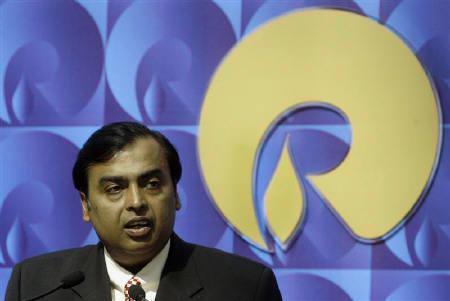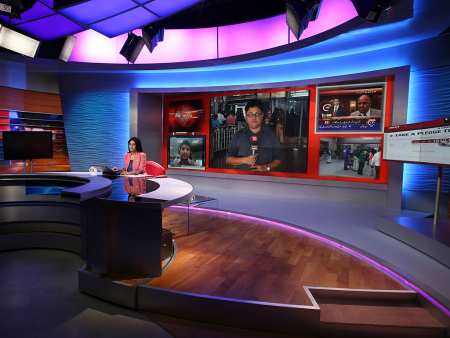 | « Back to article | Print this article |
Mukesh Ambani plans mega-server of content
Reliance Infotel is looking at creating a mega-server of broadband content for his 4G customers.
Network 18-Eenadu is just the beginning of a bigger data and video strategy. The primetime newsmaker will now become the creator of news himself.
After months of speculation and closed-door dialogues, Mukesh Ambani is finally making a big-bang diversification into media via a complicated series of transactions that will eventually see his flagship Reliance Industries control a significant chunk of two of the leading media houses in the country - the Raghav Bahl-promoted Network 18 Group and the Eenadu Group, run by Hyderabad based Ramoji Rao.
Click NEXT to read more...
Mukesh Ambani plans mega-server of content
Most analysts believe the move is perfectly in-sync with Ambani's long-standing dream of entering the media and entertainment space dovetailing with his 4G telecom rollout through Reliance Infotel.
"The broadcasting industry is in for consolidation. This deal would trigger broadcasters building a national portfolio backed by strong network of regional channels.
"This would be just the beginning of many such deals to come in future," said Jehil Thaakar, executive director, media and entertainment at consulting firm KPMG India.
"For Ambani, given the 4G rollout which is expected next year, this could assist him to integrate the business further," added Thaakar.
Click NEXT to read more...
Mukesh Ambani plans mega-server of content
This is a typical Ambani juggernaut: silent, swift and stealthy. But it opens up possibilities for a much bigger telecom-media-entertainment consolidation.
Is he going to be the biggest data content driver in his telecom platform? Is Ambani the next media czar in our highly integrated future of information overdrive?
To start with, the Network 18-Ennadu deal will allow Infotel preferential access to the content of all the media and web properties of Network 18 and its associates and also programming and digital content of all the broadcasting channels of TV18 and its associates on a first right basis as a most preferred customer.
Click NEXT to read more...
Mukesh Ambani plans mega-server of content
Reliance expects digital content from entertainment, news, sports, music, weather, education and other genres will be a key driver to increase consumption of broadband.
Ambani, say media industry officials, wants to create a mega server of content.
This will include a large library of national, international and regional movies in multiple genres, television shows, non-film offerings, music, games and applications. There will be a choice of over 100 TV channels including High Definition ones and other exclusive channels for his mobile and broadband users at rock bottom rates.
The invasion into homes will be through handsets or mobiles as well as set top boxes that combine TV channels, on-demand video and video-conferencing.
Click NEXT to read more...
Mukesh Ambani plans mega-server of content
Trial runs for both are currently on as have been negotiations with cable companies for leasing out additional bandwidth capacity.
Apart from Network 18 and Eenadu, Ambani is also looking at many partners for his broadband content. "The company has already initiated talks with various content providers like Balaji Telefilms, Shemaroo, Walt Disney-UTV, Yash Raj Films and Eros International," says an official, who is privy to these negotiations.
Reliance Infotel already has an entertainment division which is headed by Jagdish Kumar, a former Star India President (South). In future, the company may even enter full-fledged entertainment business like younger brother Anil Ambani, industry officials said.
Click NEXT to read more...
Mukesh Ambani plans mega-server of content
"Ambani has always been saying he wanted the telecom handset to also double up to offer data, TV content and streaming videos.
"He has more spectrum of 20 MHz but at one third the 3G spectrum price and now, he will have national content of news and entertainment. It's an unbeatable proposition," says a CEO of a media company on condition of anonymity.
The genesis of this strategy was set in motion last year with the dramatic re-entry of Ambani into telecom. In June 2010, little known Infotel Broadband won nationwide BWA spectrum paying $2.7 billion.
Within hours of that, RIL bought out the company for a billion dollars.
Click NEXT to read more...
Mukesh Ambani plans mega-server of content
The billion dollar bet this time around is wireless data. And even there, the differentiation is video. It's easy to sell and drives up traffic.
"Increasingly, telcos are facing a challenge to convince people what the broadband connection is for. Here, Reliance is tying up with the best in class media brands.
"If you need to control the different pieces of the value chain (Read basic telecom service+data provider+exclusive content+media partnerships), then the value of your platform increases and you can monetise exclusive content as well.
"And in content, video draws out the differentiation and drives up consumption," says Kunal Bajaj, the India head of Analysys Mason, a telecom consulting firm.
Click NEXT to read more...
Mukesh Ambani plans mega-server of content
Production companies too are lapping up this new bonanza. Typically, they syndicate their software to content-selling companies, telcos or online portals through various revenue sharing deals.
And already many production houses like Eros, Shemaroo have started dabbling in delivery of film-based content such as music, videos, games and movies including short 15 minute versions of blockbusters like Sholay, Chupke Chupke through new media.
Broadband entertainment clearly is going to be the game changer for delivery of content.
"Most production houses are sitting on a goldmine of content. With BWA rollout, content will be delivered at a faster pace and an innovative way.
Click NEXT to read more...
Mukesh Ambani plans mega-server of content
"The quality will be better and will change the entire eco-system of the industry. With the BWA spectrum and LTE technology will assist him to increase the efficiency of the server and much faster and real time downloads.
"Once it's done this form of entertainment through videos and movies will hog the limelight," said Thakkar.
Reliance Infotel plans to launch its service in the second half of 2012. The rollout will begin from the metro cities and then scale it up to a countrywide network. It plans to provide data connectivity with speeds of 50-100 mbps, which is much faster than 3G services currently on offer which offer 3-7 Mbps.
Buying the spectrum at much lower price will also assist in offering the faster service at much cheaper rates.









